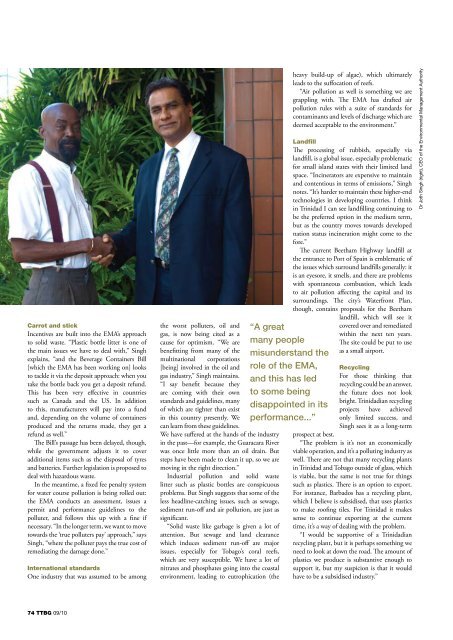The Trinidad & Tobago Business Guide (TTBG, 2009-10)
- No tags were found...
Create successful ePaper yourself
Turn your PDF publications into a flip-book with our unique Google optimized e-Paper software.
Carrot and stick<br />
Incentives are built into the EMA’s approach<br />
to solid waste. “Plastic bottle litter is one of<br />
the main issues we have to deal with,” Singh<br />
explains, “and the Beverage Containers Bill<br />
[which the EMA has been working on] looks<br />
to tackle it via the deposit approach: when you<br />
take the bottle back you get a deposit refund.<br />
This has been very effective in countries<br />
such as Canada and the US. In addition<br />
to this, manufacturers will pay into a fund<br />
and, depending on the volume of containers<br />
produced and the returns made, they get a<br />
refund as well.”<br />
<strong>The</strong> Bill’s passage has been delayed, though,<br />
while the government adjusts it to cover<br />
additional items such as the disposal of tyres<br />
and batteries. Further legislation is proposed to<br />
deal with hazardous waste.<br />
In the meantime, a fixed fee penalty system<br />
for water course pollution is being rolled out:<br />
the EMA conducts an assessment, issues a<br />
permit and performance guidelines to the<br />
polluter, and follows this up with a fine if<br />
necessary. “In the longer term, we want to move<br />
towards the ‘true polluters pay’ approach,” says<br />
Singh, “where the polluter pays the true cost of<br />
remediating the damage done.”<br />
International standards<br />
One industry that was assumed to be among<br />
the worst polluters, oil and<br />
gas, is now being cited as a<br />
cause for optimism. “We are<br />
benefitting from many of the<br />
multinational corporations<br />
[being] involved in the oil and<br />
gas industry,” Singh maintains.<br />
“I say benefit because they<br />
are coming with their own<br />
standards and guidelines, many<br />
of which are tighter than exist<br />
in this country presently. We<br />
can learn from these guidelines.<br />
We have suffered at the hands of the industry<br />
in the past—for example, the Guaracara River<br />
was once little more than an oil drain. But<br />
steps have been made to clean it up, so we are<br />
moving in the right direction.”<br />
Industrial pollution and solid waste<br />
litter such as plastic bottles are conspicuous<br />
problems. But Singh suggests that some of the<br />
less headline-catching issues, such as sewage,<br />
sediment run-off and air pollution, are just as<br />
significant.<br />
“Solid waste like garbage is given a lot of<br />
attention. But sewage and land clearance<br />
which induces sediment run-off are major<br />
issues, especially for <strong>Tobago</strong>’s coral reefs,<br />
which are very susceptible. We have a lot of<br />
nitrates and phosphates going into the coastal<br />
environment, leading to eutrophication (the<br />
“A great<br />
many people<br />
misunderstand the<br />
role of the EMA,<br />
and this has led<br />
to some being<br />
disappointed in its<br />
performance...”<br />
heavy build-up of algae), which ultimately<br />
leads to the suffocation of reefs.<br />
“Air pollution as well is something we are<br />
grappling with. <strong>The</strong> EMA has drafted air<br />
pollution rules with a suite of standards for<br />
contaminants and levels of discharge which are<br />
deemed acceptable to the environment.”<br />
Landfill<br />
<strong>The</strong> processing of rubbish, especially via<br />
landfill, is a global issue, especially problematic<br />
for small island states with their limited land<br />
space. “Incinerators are expensive to maintain<br />
and contentious in terms of emissions,” Singh<br />
notes. “It’s harder to maintain these higher-end<br />
technologies in developing countries. I think<br />
in <strong>Trinidad</strong> I can see landfilling continuing to<br />
be the preferred option in the medium term,<br />
but as the country moves towards developed<br />
nation status incineration might come to the<br />
fore.”<br />
<strong>The</strong> current Beetham Highway landfill at<br />
the entrance to Port of Spain is emblematic of<br />
the issues which surround landfills generally: it<br />
is an eyesore, it smells, and there are problems<br />
with spontaneous combustion, which leads<br />
to air pollution affecting the capital and its<br />
surroundings. <strong>The</strong> city’s Waterfront Plan,<br />
though, contains proposals for the Beetham<br />
landfill, which will see it<br />
covered over and remediated<br />
within the next ten years.<br />
<strong>The</strong> site could be put to use<br />
as a small airport.<br />
Recycling<br />
For those thinking that<br />
recycling could be an answer,<br />
the future does not look<br />
bright. <strong>Trinidad</strong>ian recycling<br />
projects have achieved<br />
only limited success, and<br />
Singh sees it as a long-term<br />
prospect at best.<br />
“<strong>The</strong> problem is it’s not an economically<br />
viable operation, and it’s a polluting industry as<br />
well. <strong>The</strong>re are not that many recycling plants<br />
in <strong>Trinidad</strong> and <strong>Tobago</strong> outside of glass, which<br />
is viable, but the same is not true for things<br />
such as plastics. <strong>The</strong>re is an option to export.<br />
For instance, Barbados has a recycling plant,<br />
which I believe is subsidised, that uses plastics<br />
to make roofing tiles. For <strong>Trinidad</strong> it makes<br />
sense to continue exporting at the current<br />
time, it’s a way of dealing with the problem.<br />
“I would be supportive of a <strong>Trinidad</strong>ian<br />
recycling plant, but it is perhaps something we<br />
need to look at down the road. <strong>The</strong> amount of<br />
plastics we produce is substantive enough to<br />
support it, but my suspicion is that it would<br />
have to be a subsidised industry.”<br />
Dr Joth Singh (right), CEO of the Environmental Management Authority<br />
74 <strong>TTBG</strong> 09/<strong>10</strong>


















